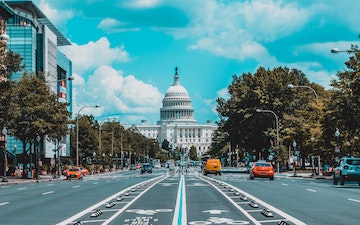
Jorge Alcala/Unsplash
Anita Varma, PhD (@anitawrites) is the assistant director of Journalism & Media Ethics at the Markkula Center for Applied Ethics at Santa Clara University where she leads the Solidarity Journalism Initiative. Views are her own.
In the long hours of Wednesday, January 6 and the days following, a cast of characters emerged in lead news coverage: President Trump, Vice President Pence, Mitch McConnell, Ted Cruz, Josh Hawley, Capitol police, and many MAGA supporters – some of whom forcibly entered the Capitol and sent the day into disarray. Chaos escalated into grim terrain with shots fired and the discovery of pipe bombs on the premises.
As people in the Senate took cover, journalists and elected representatives began to tweet updates, and some called into news programs about what was happening. Senator Tammy Duckworth, for example, called into NBC News and stated that members of the Senate would not leave without finishing the scheduled vote to affirm the Electoral College’s results of the 2020 presidential election. In the days following, many stories have focused on whether Trump would be removed from office for sedition, social media companies’ decisions to disable Trump’s accounts, and identifying the armed MAGA followers who occupied the Capitol.
Despite an enormous amount of coverage and a range of frames and angles, the story remains half-told.
News coverage that focuses on wrongdoers without accounting for people subjected to the implications of their actions does not (yet) do justice to accurately reporting the day’s events. The impact of Wednesday stretched beyond the Capitol building. Uncovering the psyche of each person in the Capitol that day still falls short of representing what happened and is still happening: domestic terrorism.
Covering domestic terrorism with an ethic of solidarity means more regularly centering the lived experiences of people subjected to terror, not solely the people who enabled, participated, and perpetuated it.
For example, DCIst published an excellent and uncommon story “‘I Did Not Feel Safe’: How The Insurrection At The Capitol Affected D.C. Essential Workers” that frames the day’s events around the impact they had on people working and attempting to move within DC, on a day when the city entered lockdown due to the occupation of the Capitol.
What elevates an event from the realm of misguided individuals acting alone or a scattershot scuffle of poorly organized groups to the level of domestic terrorism lies in the larger attempt to dismantle people’s reasonable expectation of safety and stability during a Constitutionally-mandated transfer of power.
At a cultural level, Wednesday’s chaotic and violent turn of events undercuts the core of what the United States regularly (and quite minimally) promises its citizens and residents: an opportunity to live and work. Marginalized communities know, of course, that this opportunity is unevenly distributed even in the absence of an occupied Capitol. Terrorism succeeds as it foments dread where the quotidian used to unfold, and marginalizes people by shoving them into conditions of fear which erect physical and psychological barriers to engaging in normal activities.
Accurate terminology to characterize Wednesday’s events matters, and can only be accurate if it captures the scale and stakes of what took place. Representing these stakes is not limited to a lofty theory of American democracy (which The Atlantic’s Adam Serwer compellingly argues has never been the stalwart pillar of peaceful inclusion some imagine it to be). Capturing the tangible, concrete, and indisputable stakes of this story requires accounting for the experiences of actual people who live and work in a place that is acutely and collectively endangered – and who, nevertheless, continue to persist through the fear together.
The Solidarity Journalism Initiative and Resolve Philly will hold a set of free virtual workshops during the week of January 18 to discuss techniques for covering domestic terrorism. If you are a journalist, editor, journalism student, or journalism educator and would like to attend, please contact avarma2@scu.edu.
